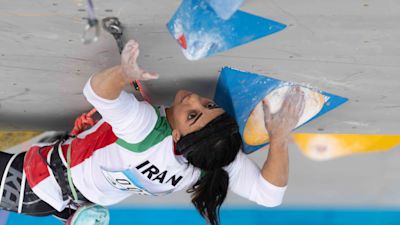Fears grow for female Iranian climber who defied strict dress code and competed without hijab

An Instagram story on the athlete's page says she "unintentionally" didn't wear the compulsory headscarf. Rachel Younger reports.
Concerns are growing for an Iranian competitive climber, after she took part in an event on Sunday without her nation's mandatory headscarf covering.
Elnaz Rekabi has now returned to Iran following her participation at the event in Seoul, South Korea, according to authorities.
Ms Rekabi, a multiple medalist in competitions, made the decision to forgo the headscarf or hijab in the wake of national protests.
Demonstrations, drawing school-age children, oil workers and others are now entering their fifth week, after the death of Mahsa Amini while in police custody.
Last month, the 22-year-old had been arrested by Iran's morality police for violating the country’s strictly enforced Islamic dress code.
The protests represent the most-serious challenge to Iran's theocracy since the mass protests surrounding its disputed 2009 presidential election.
On Tuesday, an Instagram story was uploaded onto an account attributed to Ms Rekabi, which said she "unintentionally" chose not to wear a hijab.
"Greetings to all my dear and honourable countrymen in Iran. I Elnaz Rekabi, a member of the national rock climbing team for the last 20 years want to apologise for the anxieties I have caused," the post read.
"I must state that due to existing sensitivities during the Asian championships finals in South Korea and an unexpected call to take part in the climb as a result of unsuitable timetable, my head cover unintentionally became problematic.
"I am currently, as scheduled, on my way to return to Iran with the national team."
Want a quick and expert briefing on the biggest news stories? Listen to our latest podcasts to find out What You Need To Know...
However, it's not become immediately clear if the post was made by Ms Rekabi herself and what condition she was in at the time it was made.
The Iranian government routinely pressures activists at home and abroad, airing what rights group describe as coerced confessions on state television.
According to the Iranian Embassy in Seoul, Ms Rekabi left the South Korean capital on a Tuesday morning flight.
In a tweet it said it denied “all the fake, false news and disinformation” regarding her departure.
The post was accompanied by a photo of the climber, though it was not from the event in Seoul and was instead of her wearing a headscarf at a previous competition in Moscow.
The Korea Alpine Federation - which organises the International Federation of Sport Climbing’s Asia Championship - confirmed Ms Rekabi did not wear a hijab during Sunday's final.
Until the final took place, Ms Rekabi had wore a hijab during her initial appearances, according to federation officials.
But in the final she wore just a black headband with her dark hair pulled back in a ponytail.
She was on Iran’s 11-member delegation to the one-week climbing event, which comprised of eight athletes and three coaches.
Federation officials said they were not initially aware of Ms Rekabi competing without the hijab, but looked into the case after receiving inquires about her.
They said the event doesn’t have any rules on requiring female athletes wearing or not wearing headscarves.
However, Iranian women competing abroad under the Iranian flag always wear the hijab.
"Our understanding is that she is returning to Iran, and we will continue to monitor the situation as it develops on her arrival," the Korea Alpine Federation said in a statement.
“It is important to stress that athletes’ safety is paramount for us and we support any efforts to keep a valued member of our community safe in this situation.”
To date, human rights groups estimate that more than 200 people have been killed during the recent protests and the ensuing security force crackdown. Iran has not offered an official death toll in weeks.
Demonstrations have been seen in more than 100 cities, according to Human Rights Activists in Iran, leading to thousands of arrests.